A new paper on belief in conspiracy theories has been doing the rounds on Twitter. The researchers asked Democrats and Republicans whether they believed in a large number of conspiracy theories. Contrary to popular belief, they found no evidence that Republicans were more likely to believe in conspiracy theories. Rather, they simply believed in different conspiracy theories. The researchers’ main result is shown below:
As you can see, Republicans were more likely to believe the threat of Covid is exaggerated, Obama was not born in the US, and global warming is a hoax. By contrast, Democrats were more likely to believe Trump is covering up his Covid symptoms, the GOP steals elections, and Trump made a deal with Putin. There were several conspiracy theories the two groups were equally likely to believe.
While the study is interesting and well-done, one thought I had upon seeing the chart above is that one prominent conspiracy theory is missing. What about the belief that there’s “systemic police racism” in the United States? You might say that’s not a conspiracy theory, regardless of whether it’s true. But I would argue it’s at least as much of a conspiracy theory as the idea that the threat of Covid is exaggerated.
The researchers define conspiracy theory as “an explanation of an event or circumstance that accuses powerful actors of working in secret for their own benefit, against the common good, and in a way that undermines bedrock societal norms, rules, or laws”. However, this is not the only definition available.
The political scientist Michael Barkun distinguishes three types of conspiracy theory. The first is event conspiracies, where the conspiracy concerns limited and well-defined events (e.g., the assassination of President Kennedy). The second is systemic conspiracies, where the conspiracy concerns ongoing machinations by a group of people (e.g., Jews, Freemasons, the Illuminati). The third is superconspiracies, where multiple conspiracy theories are linked together hierarchically (e.g., the work of David Icke).
There’s a case to be made that “systemic police racism” is of the second type, with the group in question being police officers, and the ongoing machinations being racially motivated shootings of black men. According to this conspiracy theory, a disproportionate number of black men are shot by police because of “systemic” racism within law enforcement, rather than for any more mundane reason.
In order to make this case, I will first present evidence that there is a widespread belief in “systemic police racism”. I will then explain why this belief qualifies as a conspiracy theory, as opposed to just a normal theory. And I will conclude by outlining why it matters.
As Zach Goldberg has shown, media mentions of “systemic racism” (and its synonyms) have increased dramatically since 2015, which coincidentally is the year after the Ferguson protests that followed the police shooting of Michael Brown.
Interestingly, however, it wasn’t until the death of George Floyd on 25 May 2020 that “systemic racism” and “police racism” really entered the mainstream – as this chart of Google search interest shows. (Note: the blue line is for “systemic racism”; the red line is for “police racism”; the spike occurs at the start of June.)
It was around this time that numerous commentators began blaming the death of George Floyd, and various other black men, on “systemic” racism within law enforcement.
An article for the Brennan Centre noted there is “a structural or institutional bias against people of color” among police officers, which influences “their day-to-day actions while interacting with the public”. According to the author, efforts to address “systemic” biases in law enforcement are unlikely to be effective “as long as explicit racism in law enforcement continues to endure”.
Likewise, an article in Vox noted “there’s clear evidence of continued structural racism in American policing”, including “overt racism” where “a minority of racists on the force to commit brutal acts of racial violence with impunity”. The article went on to say that “racist behaviour” is “inevitable” because police officers are “raised in a racist society and socialized in a violent work atmosphere”.
The pundit John Oliver explicitly rejected the “bad apple” theory of policing. “This clearly isn’t about individual officers,” he noted. “It’s about a structure built on systemic racism”.
Thanks to erroneous and sensational media coverage, Americans hold wildly inaccurate beliefs about the number of black men killed by police. Here are the results of a survey carried out by Skeptic magazine in October of 2020.
Respondents were asked how many unarmed black men were killed by police in 2019, with the correct answer being 13. The most common answer among very liberal Americans was “about 1000” – almost 100 times greater than the correct answer. Even among moderates, the most common answer was “about 100”. Conservatives were much more accurate, though more than 15% still said “about 1000” or higher.
Beliefs about police shootings of unarmed black men may be particularly inaccurate due to the outsize attention such cases receive. As Zach Goldberg has shown, police shootings of unarmed black men receive about ten times more media coverage than police shootings of unarmed white men.
Okay, but is “systemic police racism” really a conspiracy theory?
To begin with, aren’t police officers too large a group to be accused of participating in a conspiracy? According to Wikipedia, there are around 900,000 police officers in the US, which is much smaller than the number of Jews (7.5 million) or Freemasons (2 million). So if various beliefs about Jews and Freemasons qualify as conspiracy theories, there’s no reason why beliefs about police officers shouldn’t. Note that when someone blames “the Jews” for something, they’re not implicating every last Jew. And it’s the same with blaming police officers.
But where’s the conspiracy – aren’t we just talking about individual police officers allowing their prejudice to affect whom they shoot at? Given that it’s illegal for police officers to shoot people simply for being black, in order for them to get away with this year after year, it would have to be sanctioned (or at least ignored) by higher ups. “Systemic” police racism implies that it isn’t just the guy holding the gun whose responsible, but the entire “system” of law enforcement.
The term ‘conspiracy theory’ has negative connotations, implying not only that the theory in question posits a conspiracy but also that the theory is false. Is this true of “systemic police racism”? Yes, it arguably is. Of course, I’m not saying there aren’t any racist police officers, or that the law enforcement wasn’t racist in the past (during the Jim Crow era, say). The question is: when it comes to explaining why so black men are shot by police, is “systemic police racism” a plausible explanation. And the answer is no.
I won’t go over all the evidence here, as this is already been done by Sean Last. (The key evidence is summarised in this Wall Street Journal op-ed by Heather MacDonald.) But I will say the following. You don’t have to do a sophisticated study to know that “systemic police racism” is almost certainly not the reason why so many black men are shot by police. You just have to know a few basic facts.
First, about 95% of people shot by police are men, even though men are only 50% of the population. Despite this huge disparity, nobody seriously believes there is “systemic police sexism” against men. Everyone recognises that men commit the vast majority of violent crime, and so are more likely to get into a situation where a police officer ends up shooting them.
Second, if there really were “systemic police racism”, blacks would get shot the most and whites would get shot the least. But this isn’t what happens. Asians get shot less often than whites, even though they are underrepresented among police officers. Once again, this is because Asians commit less violent crime than whites, who in turn commit less violent crime than blacks.
As Heather MacDonald notes, blacks not only commit violent crime at the highest rates, they also kill police officers at the highest rates. Between 2005 and 2014, blacks made up 40% of those who killed police officers. Yet they’re “only” about 30% of those killed by police. “A police officer,” MacDonald writes, “is 18½ times more likely to be killed by a black male than an unarmed black male is to be killed by a police officer.”
Why does all this matter? The idea of “systemic police racism” has been extremely harmful – both to Americans in general and black Americans in particular.
As Steve Sailer (and more recently) Scott Alexander have shown, the George Floyd protests and associated claims about “systemic police racism” are by the far the most plausible explanation for the massive and sustained rise in murder since 2020, which has been concentrated among blacks. There’s also the $1–2 billion in property damage caused by the rioters, along with the communities that were destroyed.
“Systemic police racism” as an explanation for police shootings of black men is one of the most consequential conspiracy theories of recent years. And ironically, it was promoted most heavily by those who accuse their opponents of believing conspiracy theories.
Image: Chris Yarzab, A group of LAPD officers at the Staples center, 2010
Thanks for reading. If you found this newsletter useful, please share it with your friends. And please consider subscribing if you haven’t done so already.

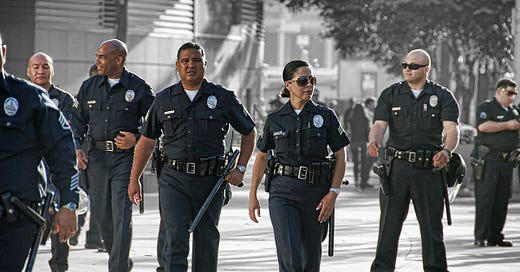



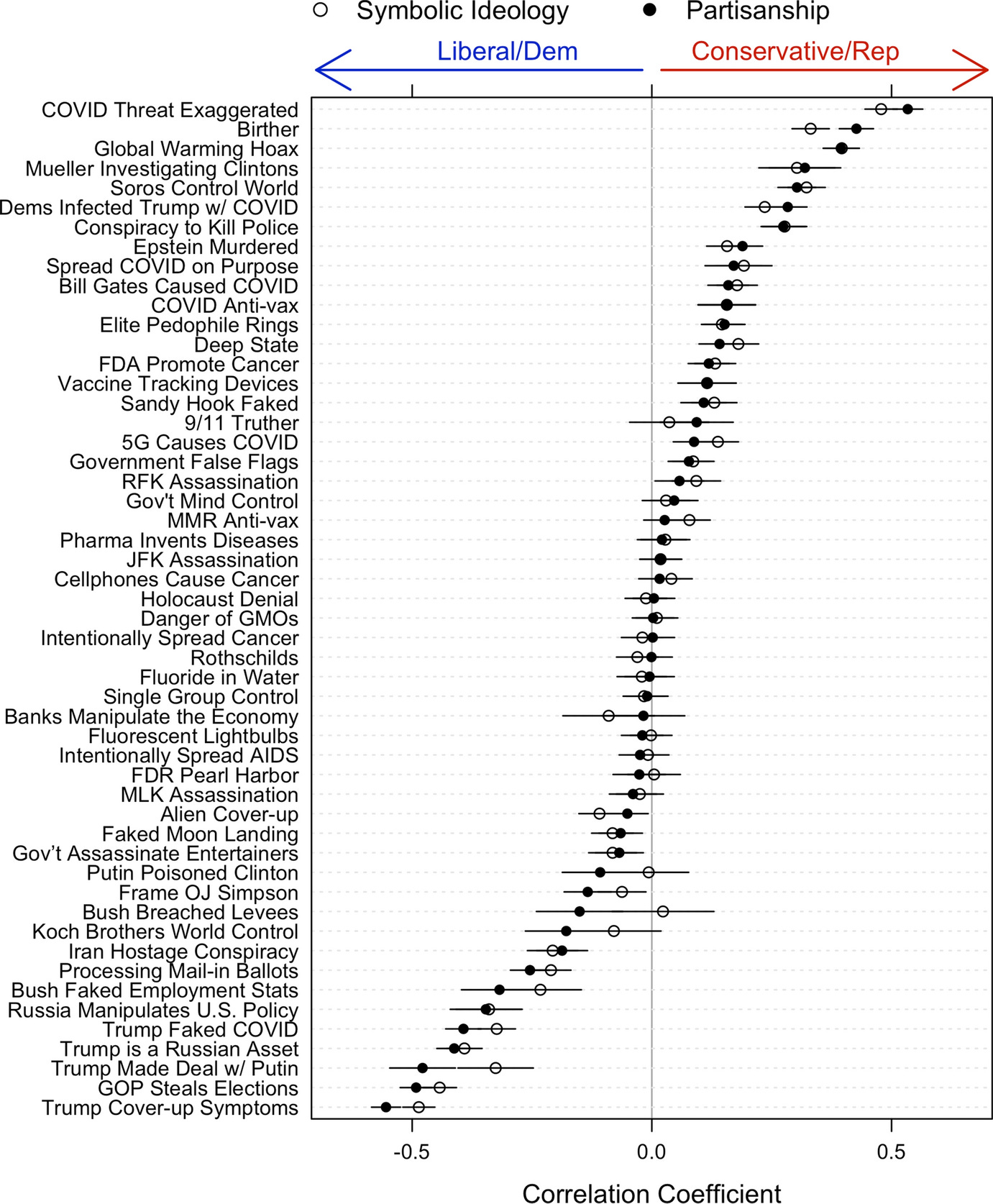
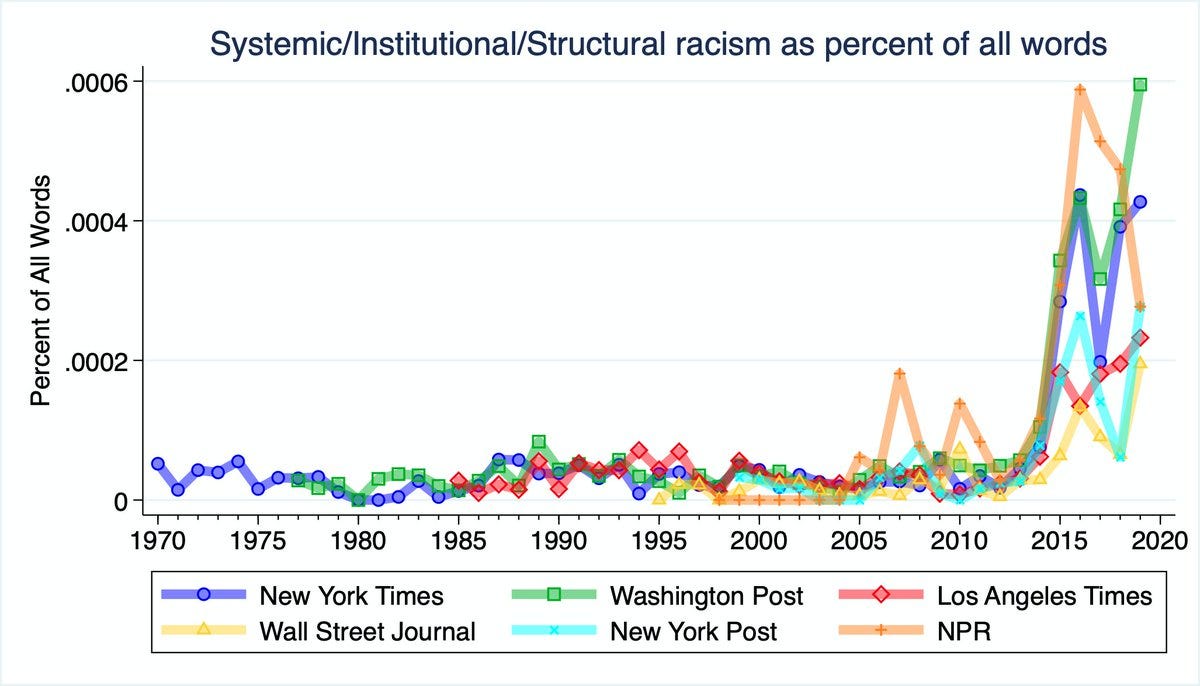

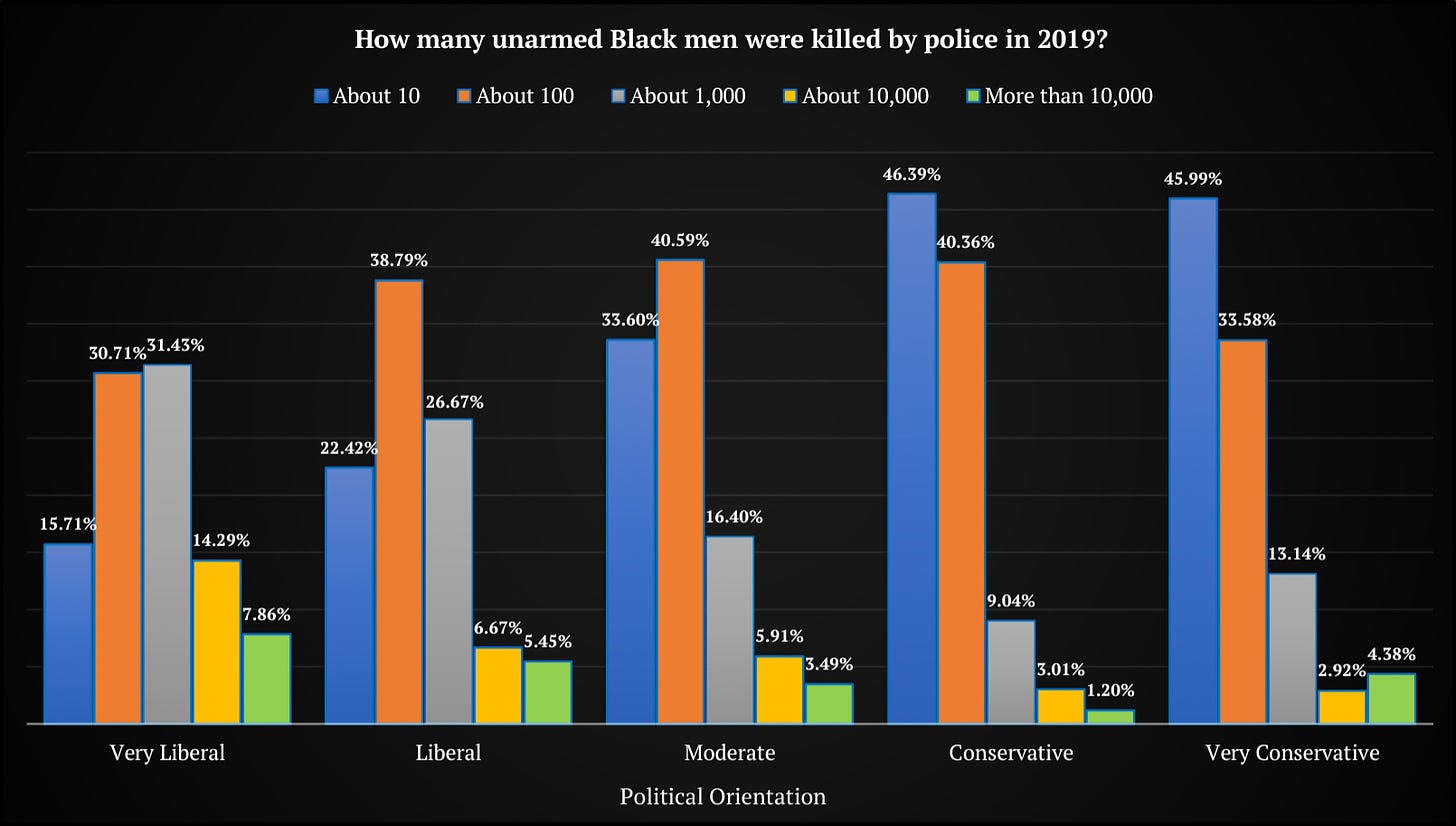
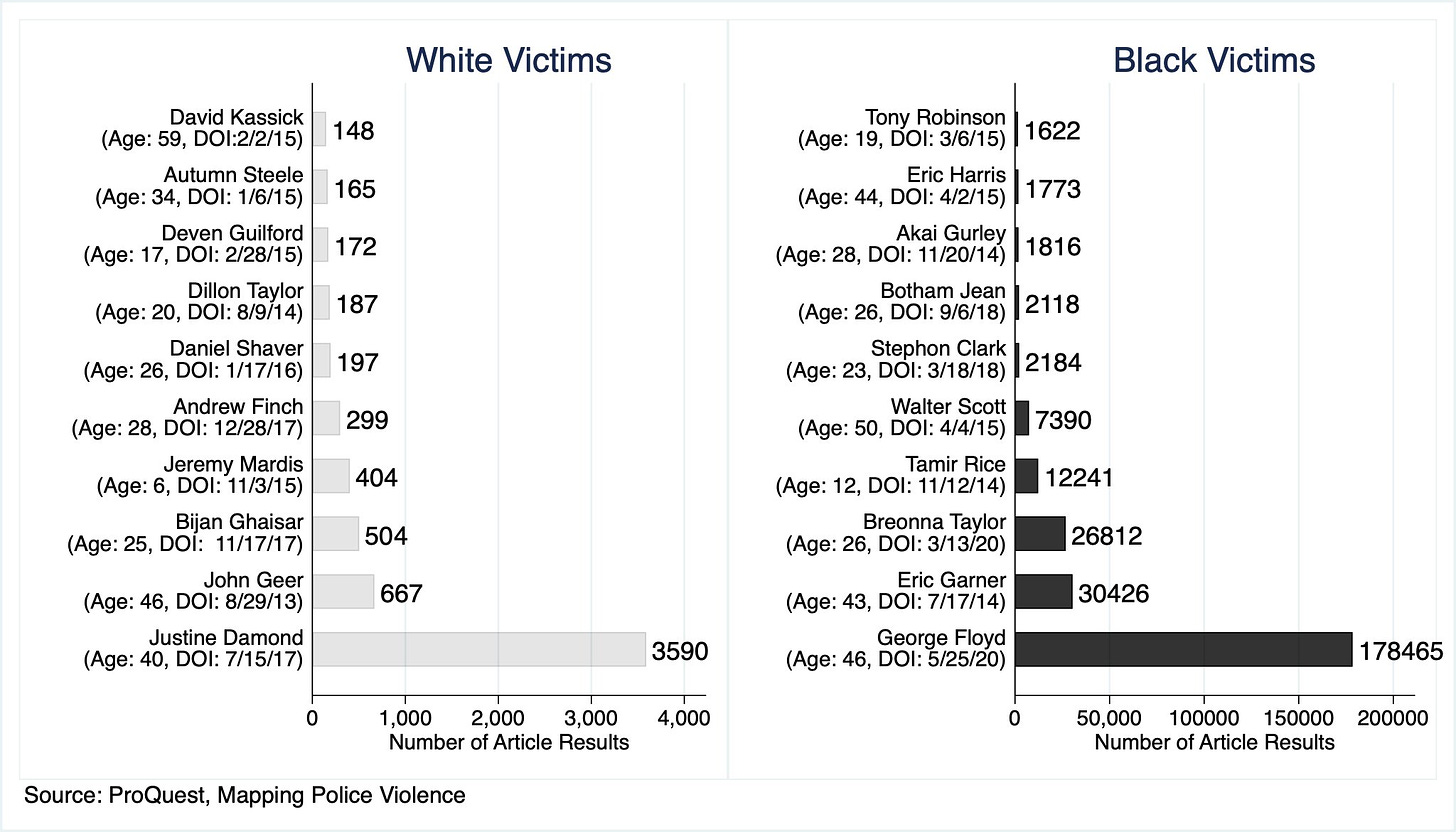
Really great article. Thanks for your work.